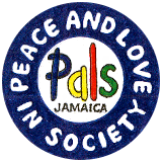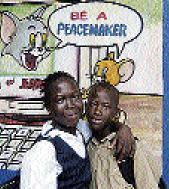Mel Cooke, Star Writer
Through the Peace and Love in Society's (PALS) Ministry of Education programme, being implemented in 90 primary and junior high, as well as 15 high schools across the island, a wide cross-section of teachers have placed their major classroom challenges on record.
Evaluations which follow sessions and general discussion, have identified as some of the challenges faced by teachers, indiscipline among students, lack of respect, fights, inadequate classroom skills and behaviour management techniques, lack of student motivation, class size and oppressive and autocratic leadership.
Individually and, especially, combined, these factors add up to major disruption, and at one school, it was estimated that a staggering 56 days from the school year were lost due to dealing with conflicts.
Now coming to the end of the first school term of a five-year memorandum of understanding with the Ministry of Education (MOE), PALS has been meeting the needs of teachers, who have requested the workshop on 'Handling Inappropriate Student Behaviours' most, with nearly 80 per cent of the 28 participating schools in Region 4 welcoming the practical sessions.
Simple Methods
After participating in the workshop, one teacher said, "I now understand that there are simple methods to use other than punishment." Another commented: "I now understand that punishment is not the solution for children's behaviour, but implementing the methods taught will bring success."
The teachers themselves identified some of the common causes of classroom conflict. Among these are a competitive atmosphere, the lack of conflict-resolution skills, the misuse of power by the teacher, an intolerant climate, poor communication, the inappropriate interpretation of emotions, lack of respect, lack of resources, and lack of self-management skills.
The PALS programme speaks directly to tackling many of the problems, as PALS general manager Janilee Abrikian said, the purpose of the joint initiative is to strengthen the ability of schools to prevent, manage and reduce violence and conflict, boost their capacity to deal with anti-social behaviour, and build their capacity to change the existing culture.
"Of the 15 high schools in the project, schools that have been doing outstandingly are Buff Bay High, Dunoon Technical and Donald Quarrie. Many of the primary schools have responded very positively to the rejuvenation or introduction of the PALS programme," Abrikian told THE STAR.
The Invisible Line
In terms of teachers' needs, workshops in classroom management ran a close second. And, as one participant puts it, "I now understand the importance of not paying attention to minor disturbances and how this helps with classroom control." Also speaking to the invisible line between control and chaos, after doing the workshop, another teacher said, "I now understand how to identify when I am about to lose my class control."
"'Conflict Resolution for Student Leaders' is also high on the schools' list of needs," Abrikian said, "Additionally, upon the request of the school, some PALS trainers are working with small groups of students who need behaviour-modification interventions, as well as help with anger management."
Crisis-Management Teams
Abrikian said that most of the schools on the PALS programme have set up crisis-management teams, which ensure that critical incidents are dealt with effectively and efficiently.
"We are pleased with the inroads regarding programme implementation in the schools in the PALS-MoE programme. We now look forward to helping schools build sustainability and to expanding the programme to include more schools across the island," Abrikian said.
Through the Peace and Love in Society's (PALS) Ministry of Education programme, being implemented in 90 primary and junior high, as well as 15 high schools across the island, a wide cross-section of teachers have placed their major classroom challenges on record.
Evaluations which follow sessions and general discussion, have identified as some of the challenges faced by teachers, indiscipline among students, lack of respect, fights, inadequate classroom skills and behaviour management techniques, lack of student motivation, class size and oppressive and autocratic leadership.
Individually and, especially, combined, these factors add up to major disruption, and at one school, it was estimated that a staggering 56 days from the school year were lost due to dealing with conflicts.
Now coming to the end of the first school term of a five-year memorandum of understanding with the Ministry of Education (MOE), PALS has been meeting the needs of teachers, who have requested the workshop on 'Handling Inappropriate Student Behaviours' most, with nearly 80 per cent of the 28 participating schools in Region 4 welcoming the practical sessions.
Simple Methods
After participating in the workshop, one teacher said, "I now understand that there are simple methods to use other than punishment." Another commented: "I now understand that punishment is not the solution for children's behaviour, but implementing the methods taught will bring success."
The teachers themselves identified some of the common causes of classroom conflict. Among these are a competitive atmosphere, the lack of conflict-resolution skills, the misuse of power by the teacher, an intolerant climate, poor communication, the inappropriate interpretation of emotions, lack of respect, lack of resources, and lack of self-management skills.
The PALS programme speaks directly to tackling many of the problems, as PALS general manager Janilee Abrikian said, the purpose of the joint initiative is to strengthen the ability of schools to prevent, manage and reduce violence and conflict, boost their capacity to deal with anti-social behaviour, and build their capacity to change the existing culture.
"Of the 15 high schools in the project, schools that have been doing outstandingly are Buff Bay High, Dunoon Technical and Donald Quarrie. Many of the primary schools have responded very positively to the rejuvenation or introduction of the PALS programme," Abrikian told THE STAR.
The Invisible Line
In terms of teachers' needs, workshops in classroom management ran a close second. And, as one participant puts it, "I now understand the importance of not paying attention to minor disturbances and how this helps with classroom control." Also speaking to the invisible line between control and chaos, after doing the workshop, another teacher said, "I now understand how to identify when I am about to lose my class control."
"'Conflict Resolution for Student Leaders' is also high on the schools' list of needs," Abrikian said, "Additionally, upon the request of the school, some PALS trainers are working with small groups of students who need behaviour-modification interventions, as well as help with anger management."
Crisis-Management Teams
Abrikian said that most of the schools on the PALS programme have set up crisis-management teams, which ensure that critical incidents are dealt with effectively and efficiently.
"We are pleased with the inroads regarding programme implementation in the schools in the PALS-MoE programme. We now look forward to helping schools build sustainability and to expanding the programme to include more schools across the island," Abrikian said.


 RSS Feed
RSS Feed